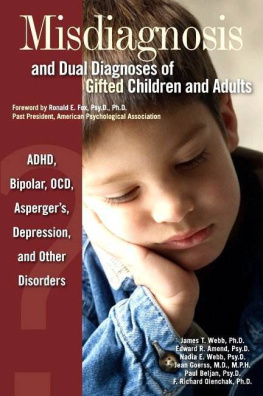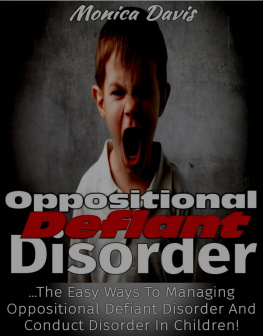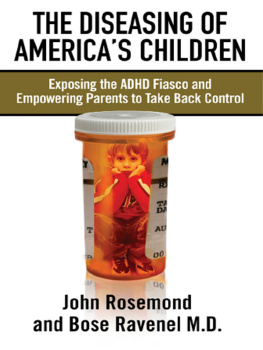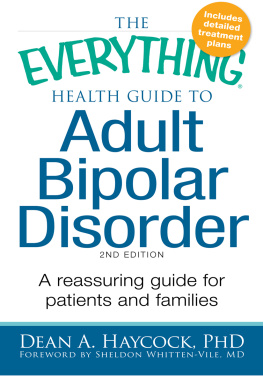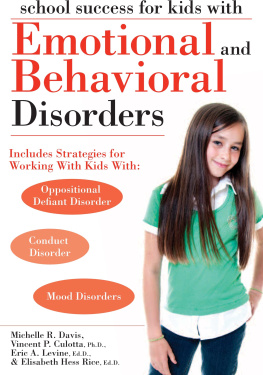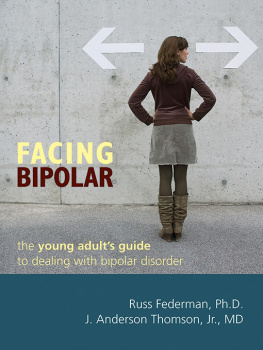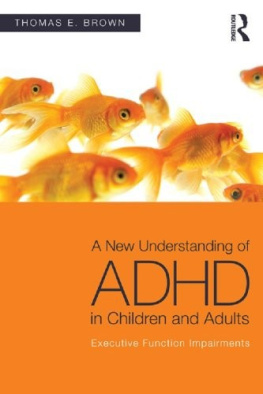Misdiagnosis and Dual Diagnoses of Gifted Children and Adults:
ADHD, Bipolar, OCD, Aspergers, Depression, and Other Disorders
by
James T. Webb, Ph.D., ABPP-Cl
Edward R. Amend, Psy.D.
Nadia, E. Webb, Psy.D.
Jean Goerss, M.D., M.P.H.
Paul Beljan, Psy.D., ABPdN
F. Richard Olenchak, Ph.D.
Great Potential Press
2005; 2012. All rights reserved.
Table of Contents
Try to see your child as a seed that came in a packet without a label. Your job is to provide the right environment and nutrients and to pull the weeds. You cant decide what kind of flower youll get or in which season it will bloom.
~ A modern educator (cited in Mogel, 2001)
Foreword
In the Summer of 2004, while flying to the 25 th reunion of the founding of the School of Professional Psychology at Wright State University in Dayton, Ohio, I struck up a conversation with a fellow passenger who turned out to be the wife of a university president. When she learned the purpose of my trip, she mentioned that she knew about Wright State Universityspecifically that the School of Professional Psychology happened to have a program called SENG (Supporting Emotional Needs of Gifted) that was dedicated to services for the gifted and their families and which was a real national treasure. Unaware that, as the founding Dean of the School, I was already familiar with the SENG program and its founder, Dr. James T. Webb, she proceeded to tell me all about it. I, of course, was more than willing to listen to her praise for my obvious good judgment in having agreed to give the program a home at Wright State, where I was Dean at the time.
Her story was familiar and very much like others I had heard over the years. Her sisters nine-year-old son, some years ago, was on the verge of being expelled from his schools regular classroom because of poor performance, lack of attentiveness, poor homework habits, impatience with classmates, and a fascinationbordering on an obsessionwith electric motors, which he insisted on pursuing regardless of what might be going on in the classroom at the time. His teacher was not only annoyed, but also quite puzzled and frustrated because the boy was highly intelligent, yet he had resisted all efforts to get him to change. Unable to control his disruptive behavior, this teacher wanted him placed in some kind of alternative program. The boys aunt, my fellow passenger, suggested that his mother contact a program called SENG located at a state university in Dayton, Ohio.
The parents brought their son to Dayton for evaluation and advice. It was determined that the boy was so intellectually gifted that his needs were far from being met in his small-town Indiana school. The parents were apprised of resources and methods for providing appropriate intellectual stimulation and were given sound advice about how to deal with his various disruptive classroom behaviors, as well as practical recommendations regarding how to deal with his siblings.
The results were quickly apparent. Despite the fact that there was no available program for the gifted in their Indiana school system at the time, the help that this family received from SENG allowed these parents to better provide for their sons intellectual and developmental needs and to see the success of their own efforts. Over the course of just a few months, the boy was transformed from a problem student into a motivated and eager learner. There was more. The change was so dramatic that the parents of another student in the same school brought their son for somewhat similar patterns of behavior and with equally dramatic results.
This encounter vividly reminded me of the early history of SENG, how it came to be housed in a new School of Professional Psychology (SOPP) at a young state university in Dayton, Ohio, and how its work resulted in the present book. The story began in 1980 with the suicide of a gifted and talented 17-year-old boy named Dallas Egbert. His parents approached Dr. James T. Webb, then an associate dean in SOPP, about possibly developing a program at Wright State University for families of gifted children. They were particularly interested in the emotional needs of such children because of their own difficulties in finding help for their son. Dr. Webb, a former Director of Psychological Services at the Childrens Medical Center in Dayton, recognized the need for such a service and rapidly outlined a program that would also meet training interests of doctoral students in the School of Professional Psychology. I approved his proposal, and we were off and running. The opportunity to work with such a special pool of children, whose needs are so often neglected in our school system, brought two things to our Schoola unique addition to SOPPs offerings for child psychology practitioners, and the opportunity to meet a real social need.
The new SENG program quickly attracted students, funding, and public attention. The financial support from the Dallas Egbert Fund, as well as a local nonprofit venture and other more traditional sources, soon made it one of the Schools best-funded programs in terms of student support. An appearance of Dallass parents and Dr. Webb on the Phil Donahue Show in 1981 brought responses from more than 20,000 viewers across the country. It was clear that the program was addressing a real need.
The SENG program was simple and directly to the point of the need. First, formal intellectual and personality assessments were provided by psychologists at the School, who then consulted individually with the gifted children and their families. Second, in response to requests from around the country, consultation services were developed for psychologists, counselors, teachers, and other professionals both individually and through workshops presented. Third, SENG developed and implemented a sequence of guided discussions with parent groupsa weekly series of 10 key topics of concern to families with gifted children. Through this experience, parents shared ideas and learned from each other. They became better able to anticipate problems, find solutions, and prevent difficulties from occurring. What was learned was that parenting a gifted child requires skills for which few parents are prepared.
By any of the measures typically used to evaluate public university academic programs, SENG was a success. It met a real social need, it led to the development of new knowledge and new methods of intervention, it resulted in numerous contributions to the scientific literature, it contributed to better professional training, and it attracted outside funding. Unfortunately, as the program matured, its backers moved on to other things. Typical to the modern university, an influx of new faculty and administrators brought new priorities and new opportunities that led in other directions. SENG at Wright State University was allowed to wither and die. Fortunately, SENG reformed itself as an independent nonprofit organization (www.sengifted.org) and continues to do good works through conferences, research grants, and speaker grants, as well as through continuing education programs for psychologists.
The greater issue, and the sad fact of the matter, however, is that the emotional needs of the gifted and talented have never been high on the social agenda of American education, nor have either the counseling or the health professions made it a priority. Focus on gifted children and adults seems somewhat elitist and undemocratic in a society in which the concerns of the poor and the needy seem to take precedence. Giving money and support to support programs for gifted children seems to many to be gilding the lily when other needs are so numerous. This is not a new phenomenon.
In 1919, a psychologist named Leta Stetter Hollingworth founded the field of gifted education when she began teaching the first college-level course on the subject at Columbia Universitys Teachers College. Seven years later, her pioneering work led to the publication of the fist textbook in gifted education, Gifted Children: Their Nature and Nurture (Hollingworth, 1926). In that book, Hollingworth elaborated on several themes that could well have been written by Webb and his associates almost seven decades laterpublic schools were failing to serve their exceptional students, gifted children are not necessarily all alike, asynchrony is inherent within giftedness, environment determines future attainments of the gifted, and children of superior intelligence may have special problems with social adjustment.

